A Comprehensive Guide to IBEW Electrical Apprenticeship Programs
Table of Contents
Ready To Learn How to Join The IBEW Apprenticeship?
Are you considering a career as an electrician and wondering how to join the IBEW? Look no further! In this comprehensive guide, we’ll walk you through the ins and outs of the IBEW Apprenticeship program, a renowned electrician union apprenticeship that offers an exceptional path to becoming a licensed electrician. By joining the IBEW, you’ll gain access to valuable training and experience while enjoying the benefits of being part of a prestigious electrician union.
Apprenticeships are an excellent way to break into the skilled trades, blending hands-on experience with classroom learning. They offer a unique opportunity to learn from seasoned professionals while earning a competitive salary.
The IBEW Apprenticeship program, in particular, is highly regarded for its structured training, support, and strong emphasis on safety. So, if you’re ready to kickstart your career and learn how to join the IBEW, this guide is for you!
In the following sections, we’ll dive deep into what an apprenticeship is and how it works. We’ll explore the different types of apprenticeship programs offered by the Electrical Training Alliance—a partnership between the IBEW and NECA. We’ll also discuss the IBEW electrician union, its membership, and the union electrician salary you can expect across the country. Finally, we’ll outline the step-by-step process of applying to an apprenticeship program—from finding the right local union to acing the IBEW Aptitude Test and interview.
So let’s jump in and explore the IBEW Apprenticeship program, unlocking your potential as a skilled union electrician!
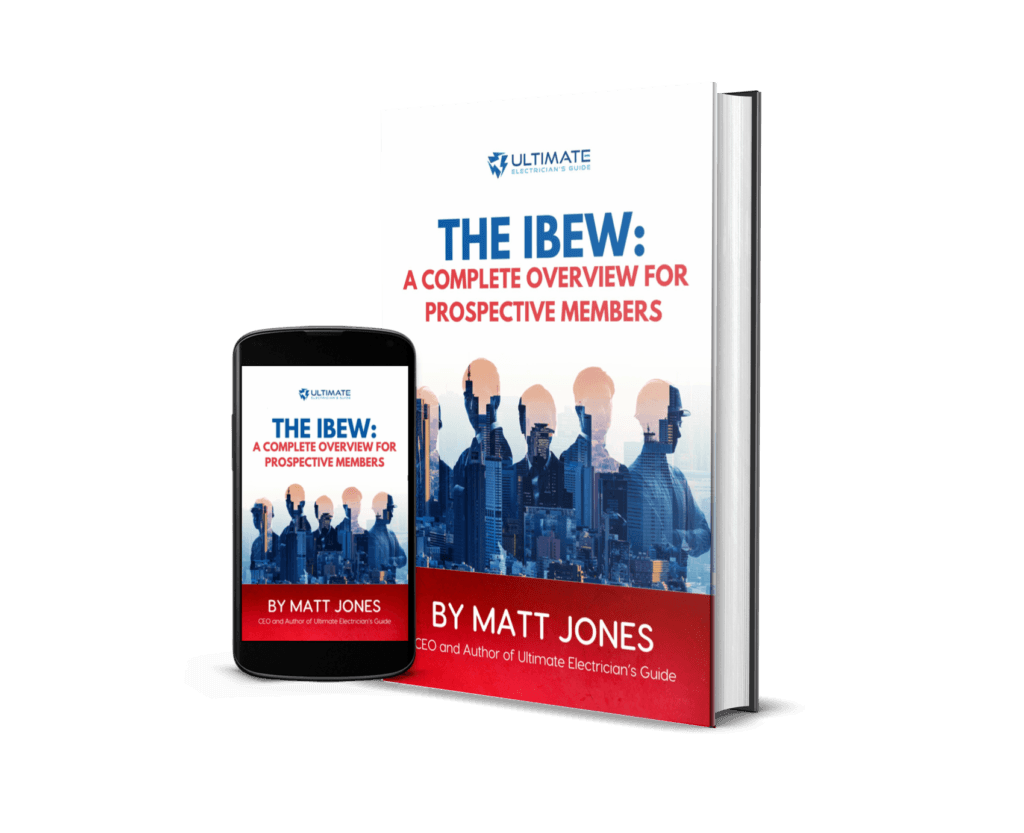
Download Our Free IBEW eBook!
Understanding Electrical Union IBEW Apprenticeships

Before we dive into the specifics of the IBEW Apprenticeship program, it’s essential to understand what an apprenticeship is and how it can pave the way to a fulfilling career as an electrician.
An apprenticeship is a work-based learning model that combines paid on-the-job training with classroom instruction. This dual approach ensures that you develop both the practical skills and theoretical knowledge required in the electrical trade.
During an apprenticeship, you’ll work alongside experienced professionals, gaining hands-on experience in real-world situations. This mentorship allows you to learn the nuances of the trade that can’t be taught in a classroom alone. Simultaneously, you’ll attend classes where you’ll study electrical theory, safety protocols, and industry regulations. This comprehensive training equips you with a well-rounded skill set that employers highly value.
Electrician union apprenticeships, like those offered by the IBEW, provide an additional layer of support and guidance. These programs are designed to ensure participants receive top-notch training while adhering to the highest safety standards. Being part of a union apprenticeship also means you’ll enjoy benefits such as healthcare, retirement plans, and collective bargaining power, which often lead to better wages and working conditions compared to non-union programs.
In the next section, we’ll introduce you to the Electrical Training Alliance—a partnership between the IBEW and NECA. This alliance ensures that participants receive the best possible training and resources to excel in their chosen trade.
The Electrical Training Alliance: IBEW and NECA Partnership
Navigating the world of electrical apprenticeships can be overwhelming, especially with all the acronyms and industry jargon. To clarify, let’s take a closer look at the Electrical Training Alliance (ETA), the organization that oversees the IBEW apprenticeship programs we’re discussing.

The ETA is a collaborative partnership between the International Brotherhood of Electrical Workers (IBEW)—the prominent electrician union—and the National Electrical Contractors Association (NECA), which represents electrical contractors. This alliance combines the union’s dedication to workers’ rights and safety with the contractors’ industry expertise to create exceptional training programs.
In essence, the ETA administers the electrician union apprenticeships created by the IBEW and NECA to provide comprehensive training for aspiring electricians. As a participant, you’ll be a member of the IBEW and work for a NECA-affiliated contractor. This arrangement ensures you receive top-quality training while gaining practical experience on real projects under the guidance of seasoned professionals.
Now that we understand the role of the ETA, let’s explore the various apprenticeship programs offered by the IBEW and discuss the potential earnings for union electricians.
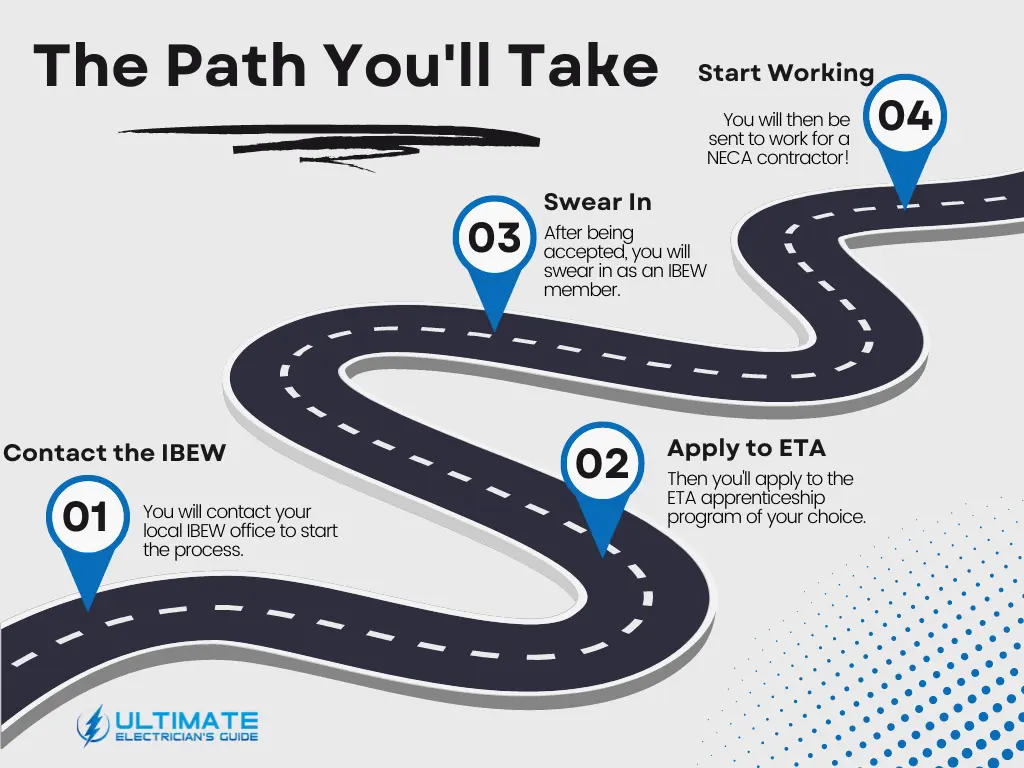
IBEW Apprenticeship Program Types
The IBEW offers a variety of apprenticeship programs to meet the diverse needs of the electrical industry. Each program focuses on a specific area of expertise, allowing you to choose the path that best aligns with your career goals and interests. In this section, we’ll provide an overview of the three main IBEW apprenticeship programs: Inside Wireman (Electrician), Voice-Data-Video (Low Voltage) Technician, and Outside Lineman.

Inside Wiremen (Electricians):
Inside Wiremen are the cornerstone of the electrical industry, focusing on systems within residential, commercial, and industrial buildings. Their work ensures that power from the main distribution point is safely delivered to lighting, outlets, and equipment, making modern living and business operations possible.
Key Highlights
- Program Length: 4 to 5 years of paid training combining hands-on experience and classroom instruction.
- Focus: Installing, maintaining, and troubleshooting building electrical systems.
- Special Opportunities: Potential to specialize in solar energy, energy management, or advanced lighting systems.
Voice-Data-Video (Low Voltage):
VDV Technicians are critical in today’s interconnected world, handling the installation and maintenance of low-voltage systems. From internet infrastructure to security alarms, they ensure seamless communication and functionality in homes, offices, and public spaces.
Key Highlights
- Program Length: 3 years of intensive training in cutting-edge technology.
- Work Includes: Networking, telecommunications, and smart building systems.
- Why It’s Unique: Constantly evolving field with high demand for technical expertise.
Outside Lineman:
Outside Linemen are responsible for the transmission and distribution of electricity, working on high-voltage lines that power cities and towns. They operate outdoors in varying conditions, ensuring communities have access to reliable energy.
Key Highlights
- Program Length: 3 to 4 years focused on mastering high-voltage systems.
- Responsibilities: Installing and repairing overhead and underground power lines.
- What Sets It Apart: Physically demanding and adventurous work environment.
Each of these IBEW apprenticeship programs offers unique challenges and rewards, allowing you to choose the path that best suits your skills and interests. Whether you’re passionate about working on complex electrical systems as an Inside Wireman, bringing the latest technology to life as a Voice-Data-Video Technician, or maintaining our power grid as a Lineman, the IBEW apprenticeship can help you build a rewarding career in the electrical industry.
Union Electrician Wages and Earnings
When considering a career as an electrician, earning potential is a significant factor. Joining the IBEW apprenticeship program not only provides exceptional training but also ensures competitive wages and comprehensive benefits. In this section, we’ll explore the salary structure for apprentices and journeyman electricians, giving you insight into the financial rewards of embarking on an electrician union apprenticeship.
Apprentice Wages: Building Your Earnings Over Time
As an apprentice, you’ll start by earning between 40% and 45% of a journeyman electrician’s wage. This starting point reflects your entry-level status while acknowledging the value you bring to the workforce. Importantly, this is just the beginning of your earnings journey. Throughout your apprenticeship, you’ll receive guaranteed pay raises every six months, gradually increasing your income as you gain skills and experience. By the time you complete the program, you’ll be earning the full journeyman wage.
In addition to competitive wages, apprentices enjoy full medical benefits and pension contributions proportional to their wage percentage. This means you’re not only earning a salary but also building a solid foundation for your future with healthcare coverage and retirement savings from day one.
How Much Will You Earn?
To provide a clearer picture of the earning potential, we’ve compiled a chart showcasing the wages of IBEW journeyman electricians in the top 13 most populated cities across the United States and Canada. This chart also includes estimated first-year apprentice wages, illustrating how your earnings will grow over time. Please note that the first-year apprentice wage is an estimate; for precise information specific to your location, it’s best to contact your local IBEW hall.

With competitive salaries, regular pay raises, and comprehensive benefits, the IBEW apprenticeship program offers a strong financial foundation for your career as a licensed electrician. By investing in your skills and knowledge through the program, you’ll be well on your way to enjoying the rewards of a prosperous career in the electrical industry.
Application Process for IBEW Apprenticeship Programs
If you’re ready to start your journey towards becoming a licensed electrician, the first step is to apply for one of the IBEW apprenticeship programs. In this section, we’ll guide you through the application process and the necessary prerequisites to join the program.
First, you’ll need to locate the IBEW local closest to you. Check “IBEW” to only filter for IBEW apprenticeships, enter your zip code, and hit search.
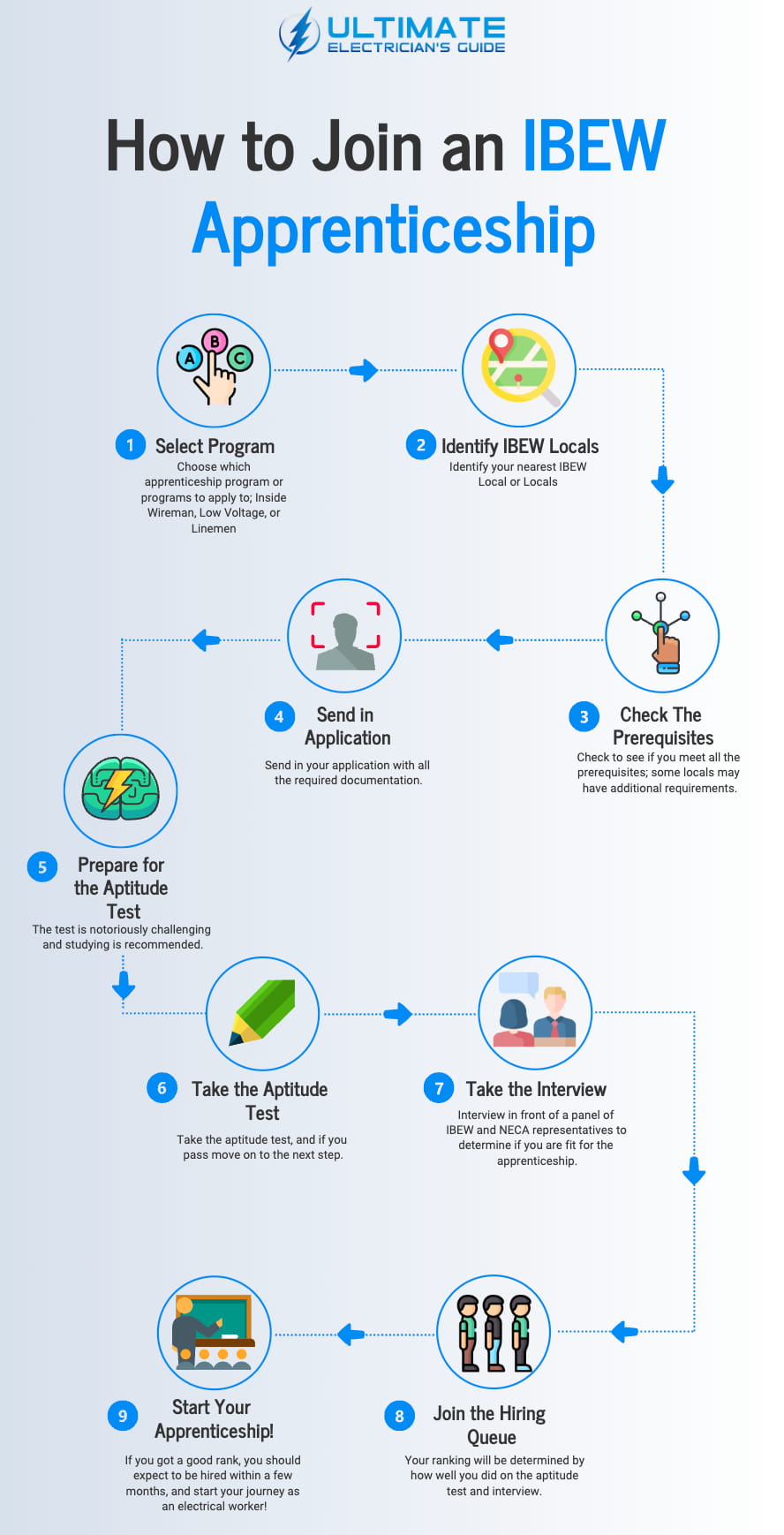
Once you’ve found your local IBEW, it’s important to ensure that you meet the prerequisites for joining the apprenticeship. You are required to have:
- 1. High School Diploma or GED
- 2. A grade of “C” or higher in an Algebra 1 class (if you don’t, you can take the IBEW Tech Math Course to qualify)
- 3. Have reliable transportation
- 4. Proof of residency and citizenship
- 5. Be at least 18 years old
With these prerequisites in place, you can proceed to submit your application as instructed by the union. Keep in mind that it may take a few weeks to hear back from them. Once your application is reviewed and approved, the union will schedule you for the aptitude test, which is a critical part of the selection process.
The IBEW Aptitude Test
After submitting your application for an IBEW apprenticeship program and meeting the prerequisites, the next step in the process is to take the IBEW Aptitude Test. This test plays a crucial role in determining your eligibility for the program, as it assesses your foundational knowledge in mathematics and reading comprehension. In this section, we’ll explore the structure of the test, its components, and how to prepare for it.
The IBEW Aptitude Test is divided into two sections: Algebra and Functions, and Reading Comprehension. The purpose of this test is to gauge your ability to understand complex mathematical concepts and analyze written information, both of which are essential skills for a successful electrician.
Between the two sections, you will be given a short break to relax and refocus before continuing with the test.
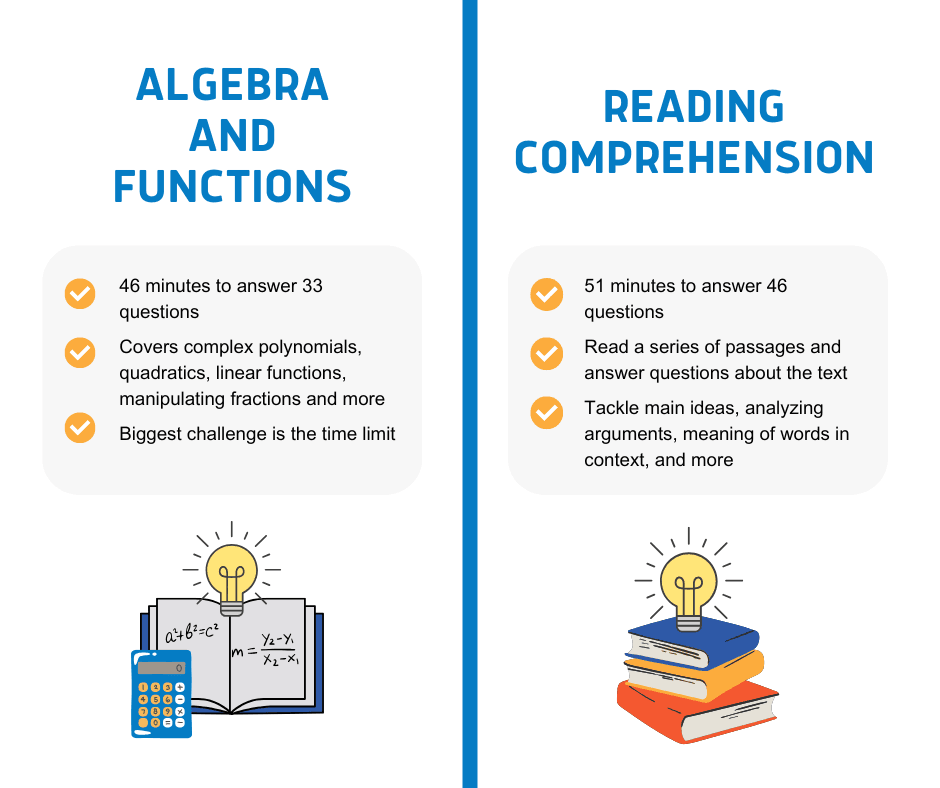
Free IBEW Aptitude Practice Exam
With a solid understanding of the IBEW Aptitude Test and adequate preparation, you’ll be one step closer to securing your spot in the IBEW apprenticeship program and ultimately becoming a licensed electrician.
The IBEW Apprenticeship Interview Process
Once you’ve successfully completed the Aptitude Test, the next step in the IBEW apprenticeship process is the interview. This stage is crucial, as it allows the panel to assess your suitability for the program and the electrical trade.
The IBEW apprenticeship interview typically takes place in front of a panel consisting of 4-8 representatives, with half of them from the IBEW and the other half from NECA. During the interview, they will ask you questions about your work experience, personal life, and situational scenarios to better understand your problem-solving skills, adaptability, and commitment to the trade.
IBEW Interview Questions
To ensure a successful interview, it’s essential to be well-prepared and ready to answer a variety of questions. At a minimum, be prepared to answer the following questions:
- “Why do you want to join the IBEW and become an electrical worker, as opposed to pursuing another trade like plumbing?”
- “Tell us about a time when you were working on an important deadline, but something of higher priority came up and prevented you from meeting the deadline. How did you handle the situation?”
- “Tell us about the most challenging project you’ve ever completed entirely on your own. What obstacles did you face, and how did you overcome them?”
In addition to these questions, it’s crucial to familiarize yourself with the IBEW and its apprenticeship programs, as well as to reflect on your own experiences and skills. This will help you provide thoughtful and comprehensive answers during the interview.
Remember, the key to a successful interview is confidence, preparation, and a genuine passion for the electrical trade. By demonstrating these qualities and effectively addressing the panel’s questions, you’ll be well on your way to securing a spot in the IBEW apprenticeship program.
Understanding the IBEW Apprenticeship Ranking System
After completing both the IBEW Aptitude Test and the apprenticeship interview, your scores from these assessments are combined to determine your overall ranking. This ranking is a critical factor in the selection process, as the apprenticeship program accepts candidates based on their position in this ranking. In essence, the higher you rank, the sooner you’ll be invited to join the IBEW apprenticeship program.
The ranking system is dynamic, meaning your position can change as new applicants enter the pool. If someone applies after you and achieves a higher combined score, they may be placed ahead of you in the queue. This shifting landscape can result in an indefinite wait time for some candidates, especially if their ranking isn’t high enough to secure an immediate spot in the program.
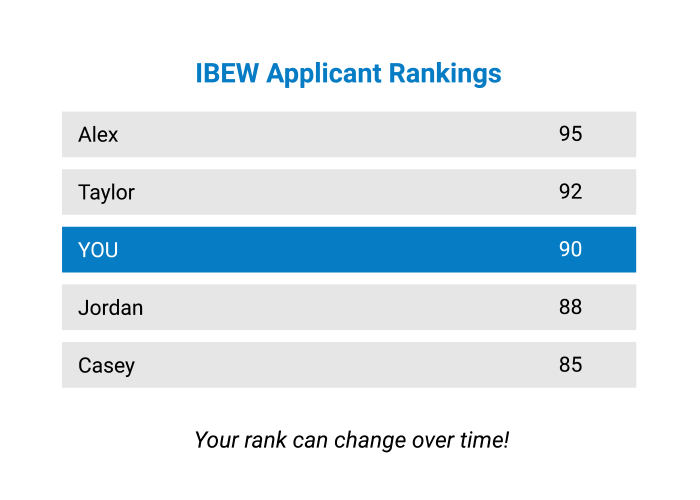
Given the competitive nature of the electrician union apprenticeship, it’s crucial to thoroughly prepare for both the aptitude test and the interview. Excelling in these assessments increases your overall ranking, enhancing your chances of being selected promptly for the apprenticeship. By dedicating time and effort to achieve high scores, you’re not only demonstrating your commitment to the trade but also positioning yourself favorably within the selection process.
IBEW Aptitude Test & Interview Prep
By thoroughly preparing for the IBEW Aptitude Test and the apprenticeship interview, you’ll improve your ranking in the queue and increase your chances of getting into the apprenticeship of your choice.
Frequently Asked Questions
In this section, we’ve compiled a list of frequently asked questions to help you better understand the IBEW apprenticeship process and clarify any doubts or concerns you might have.
What is the IBEW apprenticeship program?
The IBEW apprenticeship program is a structured pathway to becoming a skilled electrician. It combines hands-on job training with classroom learning, all under the guidance of experienced professionals. The IBEW apprenticeship is part of a union-backed initiative, ensuring quality education and fair treatment.
What are the requirements to join the IBEW apprenticeship program?
To qualify for the IBEW apprenticeship, you need to meet these requirements:
- A high school diploma or GED.
- A grade of “C” or higher in Algebra 1 (or completion of the IBEW Tech Math Course as an alternative).
- Reliable transportation to job sites and training facilities.
- Proof of residency and citizenship.
- Be at least 18 years old.
Do I need prior electrical experience to join the IBEW apprenticeship?
No, prior electrical experience is not required. The apprenticeship program is designed to teach you everything you need to know from the ground up.
How do I apply for the IBEW apprenticeship program?
To apply, locate your nearest IBEW local and submit an application. You’ll then be scheduled for an aptitude test. If you pass, you’ll proceed to an interview. Successful candidates are placed on a ranked hiring list, and apprentices are hired from this list as positions become available.
How long does the IBEW hiring process take?
The hiring process typically takes 1 to 6 months, depending on your local’s demand and competitiveness. Larger or more competitive locals may take longer.
How often do IBEW locals accept applications?
Most IBEW locals accept applications twice a year, typically on a semester-like schedule.
Can I apply to multiple IBEW locals at the same time?
Yes, you can apply to multiple locals, but you can only work for one at a time. Keep in mind that many locals require you to live within their jurisdiction to be eligible.
Is the IBEW aptitude test the same for every local?
Yes, the IBEW aptitude test is standardized across all locals.
How competitive is the IBEW apprenticeship application process?
The level of competition varies by local. Larger locals in metropolitan areas, such as Los Angeles or New York City, are extremely competitive, while smaller, rural locals may have less competition.
Can I test into a higher year in the IBEW apprenticeship?
Rules vary by local, but advancing into a higher apprenticeship year without starting at the beginning is rare and typically difficult to achieve.
Can I transfer my apprenticeship to another IBEW local if I move?
No, apprenticeships must be completed at the local where you started. Once you earn your journeyman’s license, however, you’re free to work anywhere.
How long is the IBEW apprenticeship program?
The duration of the program depends on your specialty:
• Inside Wireman Program: 4-5 years.
• Linemen and VDV Programs: 3 years.
Am I too old to start an IBEW apprenticeship?
No, there’s no strict upper age limit for joining the IBEW. Most applicants are in their 30s, and even older candidates are welcome. However, individuals over 60 may find the physical demands challenging.
Can I join the IBEW if I’m colorblind?
Unfortunately, no. Being able to distinguish colors is a crucial requirement for electrical work due to the need to identify wire colors accurately.
